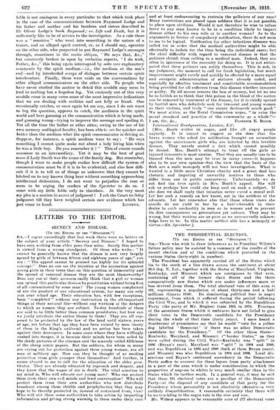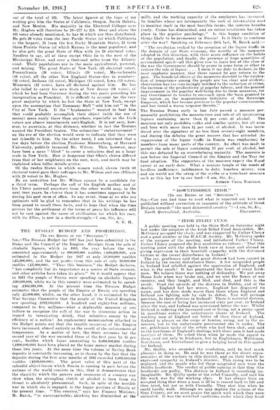THE PRESIDENTIAL ELECTION.
(To TEE EDITOR. OF THE " SPECTATOR."] SIR,—Those who wish to draw inferences as to President Wilson's future policy may be assisted by a summary of the results of the recent election and of the conditions which prevailed in the various States (forty-eight in number).
The President has apparently carried all of the States which lie to the south of a line drawn across the continent at about 36.5 deg. N. Lat., together with the States of Maryland, Virginia, Kentucky, and MisSouri which are contiguous to that area, containing all of the former slave States and the three comparatively new States which are under influence.; more or less derived from them. The total electoral vote of this area is 181, representing a population of about thirty-one and a half millions (Census 1910). Its dominating political fear is negro supremacy, from which it suffered during the period following the Civil War, and to which it was subjected by the Republican Party (the party of Mr. Hughes) from 1865 to 1876. Fourteen of the seventeen States which it embraces have not failed to give their rotes to the Democratic candidate for the Presidency during the whole of that time (forty years). I once heard a Southerner of prominence say that he would "vote for a yellow dog labelled ' Democrat ' if there was no other Democratic candidate for the Presidency." Of the other three States— Kentucky, Maryland, and Missouri (" border States," as they were called during the Civil War)—Kentucky was " split " in 1896 (Bryan's year), Maryland was "split" in 1904 and 1908, and was Republican in 1896 and 1900 (both of them Bryan years), and Missouri was also Republican in 1904 and 1908. Local dissensions and Bryan's continued ascendency in the Democratic Party suffice to account for these lapses from party attachment in a part of the area which is under consideration in which the proportion of negroes to whites is very much smaller than in the States which lie farther south. In a general way, it may be said that these 181 electoral votes are a peculiar of the Democratic Party—at the disposal of any candidate of that party for the Presidency whose personality is not absolutely offensive—a very unlikely disqualification. A reasonable certainty that there will be no truckling to the negro vote is the sine qua. non.
Mr. Wilson appears to be reasonably sure of 277 electoral votes out of the total of 531. The latest figuresat the time of my writing give him the States of California, Oregon, North Dakota, and New Mexico. His majority in the Electoral Colleges over Mr. Hughes will therefore be --277 to 254. Over and above the 181 votes already mentioned, he has 96 which are thus distributed. He gets 28 votes from the four Pacific States (of which California is the largest), 21 from the five Rocky Mountain States, 23 from three Prairie States (of which Kansas is the most populous), and he also gets the great State of Ohio with its 24 electoral votes. Needless to say, all of these except Ohio lie to the west of the Mississippi River, and over a thousand miles from the Atlantic coast. Their populations are in the main agricultural, pastoral, and mining. The great States of New York (45 electoral votes), Pennsylvania (38 votes), Illinois (29 votes), Massachusetts (18 votes), all the other New England States—five in number— (26 votes), Indiana (15 votes), Michigan (15 votes), Iowa (13 votes), Minnesota (12 votes), have all declared against him. He has also failed to carry his own State of New Jersey (14 votes), of which he had been Governor during the two years preceding his inauguration as President. It is difficult to account for the very great majority by which he lost the State of New York, except upon the assumption that Tammany Hall "sold him out" in the City of New York. If the " hyphenates " wanted to beat him they could probably accomplish their object (with the use of money) more easily there than anywhere, especially as the Irish voters are almost unanimously anti-English. It is not easy, however, to ascertain, at this distance, whether in fact the Teutons wanted the President beaten. The submarine " embarrassment " on the eve of the election would seem to indicate that they were not friendly to him. On the other hand, I am informed that a few days before the election Professor MOnsterberg, of Harvard University,' publicly favoured Mr. Wilson. This, however, may have been a mere " blind " to cover a nefarious deal on a large scale in New York. How it happened that Ohio's choice differed from that of her neighbours on the east, west, and north may be explained when fuller details arrive.
Of the twelve States in which women voted, eleven (with 69 electoral votes) gave their suffrages to Mr. Wilson and one (Illinois with 29 votes) to Mr. Hughes.
By an unwritten law Mr. Wilson cannot be a candidate for a third term. Perhaps the call ef his English mother and of his Ulster paternal ancestors from the other world may, in the next four years, be clearer than it has sometimes appeared to be during his past term of office. In any event, those of us who are optimists will be glad to remember that in his writings he has been proud to recall these facts, and to hope that when the time arrives for the settlement of the terms of peace his influence will not be cast against the cause of civilization for which his race, with its Allies, is now in a death-struggle.—I am, Sir, &c.,
S. R.













































 Previous page
Previous page